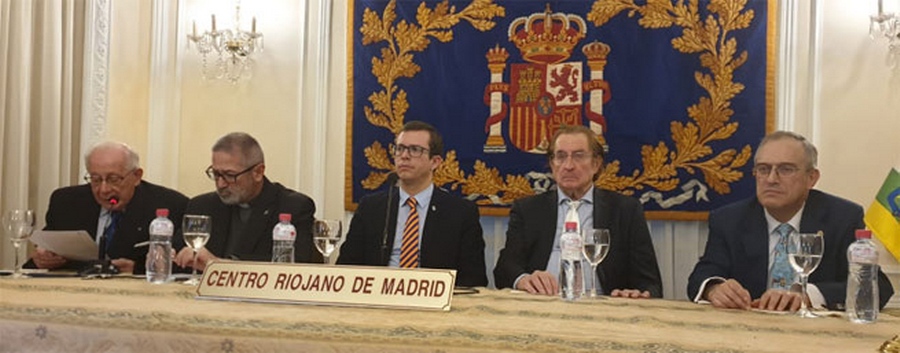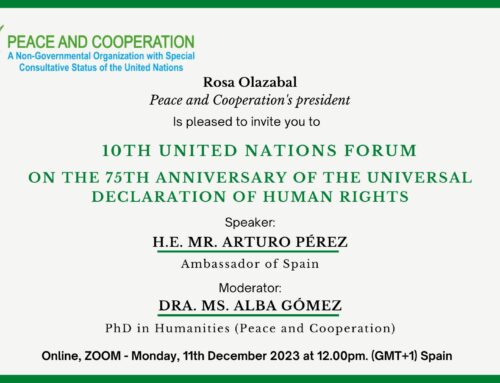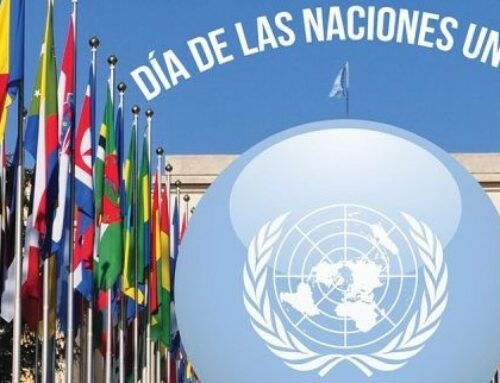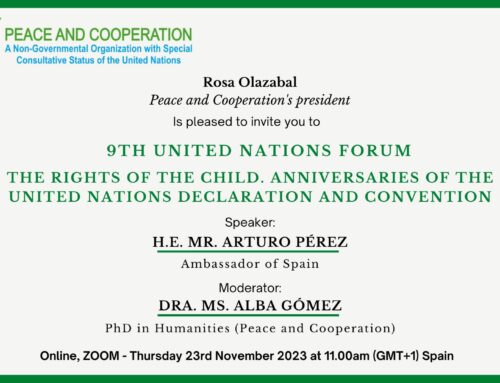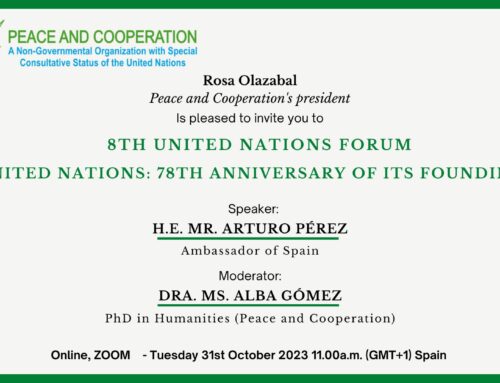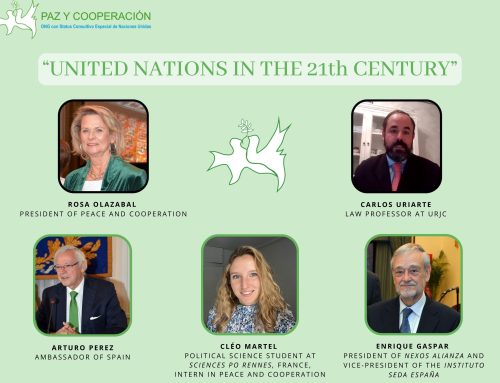On 15 April, a few days before the beginning of Holy Week, a conference on “Religious Tolerance” was held at the Centro Riojano in Madrid. This is a highly topical and relevant topic, given the recent events that have taken place on the international scene.
This conference is part of the cycle of conferences of the United Nations Forum, organized jointly by the Peace and Cooperation Foundation and the Centro Riojano in Madrid, and its next event will take place on 30 April with the Russian Embassy on “The Russian vision on the current geopolitical context. Relations between Russia and Spain”.
The conference began with the recovered José Antonio Rupérez, president of the Centro Riojano in Madrid, who presided over the table accompanied by Joaquín Antuña, president and founder of Peace and Cooperation, Alfonso Ramonet, protocol of the Archbishopric of Madrid, Pedro López Garrido, former president of the Centro Riojano and finally by M.I Mr. Avelino Revilla Cuñado, Vicar General of the Archdiocese of Madrid, who gave the great master lecture on “Religious Tolerance”.
José Antonio Rupérez, pointed out the importance of recent events such as the visit of Pope Francisco to the United Arab Emirates and Morocco, as evidence of the rapprochement between the Christian and Islamic religions. Joaquín Antuña began with the phrase “pax, shalom, salam, namaste” on the need for religion to be open to believers and non-believers, as a Pacem in terris. This commentary referred to April 11, 1963, an important event in the Catholic Church, when Pope John XXIII signed the encyclical Pacem in terris (Peace on Earth) and the Day of Peace in 2003, when Pope John Paul II referred to it as a “permanent task”. It is for this reason that we must not allow ourselves to repeat going for or against religions, but rather to develop a philosophy of encounter. For all these reasons, the United Nations Forum could not miss such an important topic as religion.
On the other hand, Alfonso Ramonet, dealt with the relevance and importance of the topic, where at the moment, taking into account the references that have taken place worldwide, tolerance is “possible and necessary”, and it is necessary to discover together what is already discovered but that we insist on ignoring. In Rabat, the meeting between the King of Morocco, Mohamed VI and Pope Francis took place, where the three emblematic chants were carried out, by the Christians the Hail Mary, by the Jews the Adonay, and by the Muslims the Adhan and that in the end all sang together. Bearing all this in mind, it is necessary to seek love apart from any political and material ideology. He then read a letter from Pedro de Borbón, Duke of Calabria, which deals with the need to see someone like us in someone’s face.
He also referred to the great M.I Señor Avellino Revilla, and his splendid biography, since he was born in 1960 in Madrid, and was ordained a priest on March 12, 1988. He studied chemistry at the Complutense University of Madrid, and was licensed in theology by the Pontifical University of Comillas in 1992 and Doctor in Theology by the Pontifical University of Salamanca in 2000. He was professor of Theology and Religious Pedagogy at the Faculty of Education of the Complutense University in 2005 and at the San Dámaso Higher Institute of Religious Sciences in 2011, and finally, he was named Vicar General of the Archdiocese of Madrid in 2015.
M.I Mr. Avelino Revilla, began by referring to the September 11 attacks on the Twin Towers, which marked a before and an after, by describing monotheistic religions as dangerous, and as the causes of suffering that constitute one of the darkest chapters in human history. To this growing debate, the position of “believing” and “knowing” was divided.
If we take a look back in time, in the various conflicts, the religious question has a stellar role, as with the Protestant Reformation and the Counter Reformation, where a strong confrontation took place, which made religious tolerance a basic element of the XV and XVI centuries in Europe. But the impossibility of solving the problem by force alone led to the creation of instruments that allowed the existence of both beliefs. Since undoubtedly, we find a divided Europe and a battleground between states, where “there can only be one faith” that made the Peace of Augsburg (Peace of religions), where the faith of each prince determined that of his subjects.
Voices appear that question these persecutions, and the theory of tolerance is slowly being composed: respect for the beliefs chosen by each individual, religious freedom and the first formulations of human rights. Tolerance is that paternalistic conception of believing that the other is in error, but is willing to overcome it, because each one has the right to live his own life. Tolerance is a public virtue, which needs to rest in any pluralistic society. That is why we tolerate what is different, what is annoying, what seems wrong, to tolerate means to endure and this involves effort or suffering.
Faced with the emergence of intolerance of certain religions, it was UNESCO in 1995 that made the Declaration of Principles on Tolerance, which established that each individual is free to adhere to his or her own convictions and accepts that others adhere to their own. Rome’s position, which recognizes Universal Tolerance in the Second Vatican Council on religious freedom with the declaration dignitatis humanae, joins it.
The need for interreligious dialogue is absolute. Today, there is an inescapable interdependence between the various parts of the world, due in part to the migrations that are fundamental in our countries, the development of technology and modern industry. These factors have led to a greater awareness of the plurality of the religions of the planet, where this interreligious dialogue in favor of Peace and Justice of the world is needed.
On October 27, 1986, in Assisi, the World Day of Prayer for Peace took place, with the participation of leaders and representatives of Christian Churches and religions from all over the world at the request of Pope John Paul II. There they came together to pray for peace, and as the spiritual strength of religions can be a source of peace. For despite processing different faiths, all there were gathered in search of the good of humanity. Without a doubt, the aim was to create an interreligious movement for peace, not an isolated event.
That is why M.I Mr. Avelino Revilla informed us that from 15 to 17 September 2019, the main leaders of the main religions will meet to carry out a Prayer for Peace, organized by the Archdiocese of Madrid, looking for “religions and cultures in dialogue”.
Finally, the recent visits of Pope Francis to the United Arab Emirates and Morocco were discussed again. In 2014 he visited the Holy Land and declared “that there should be no place for anti-Semitism, discrimination and intolerance”. This is a rapprochement, since it is necessary that the different confessions dialogue so that cooperation between people increases and that moral imperatives include peace and mutual tolerance, which can be observed in the document “on human fraternity, for world peace and common coexistence”.
He added that a Third World War is being carried out in pieces in different places, and above all the strong conviction that the teachings of religions are based on Peace, fraternity and common coexistence. That is why it is necessary to build world peace and to stop inhuman practices. The culture of dialogue, the fact that we recognize each other in an equal status, the creation of a culture of encounter is necessary.
“We are a polyhedron, with many different sides and facets, but we all form a unity, and we must not forget it. Undoubtedly, the conference dealing with “Religious Tolerance” within the United Nations Forum was necessary.

